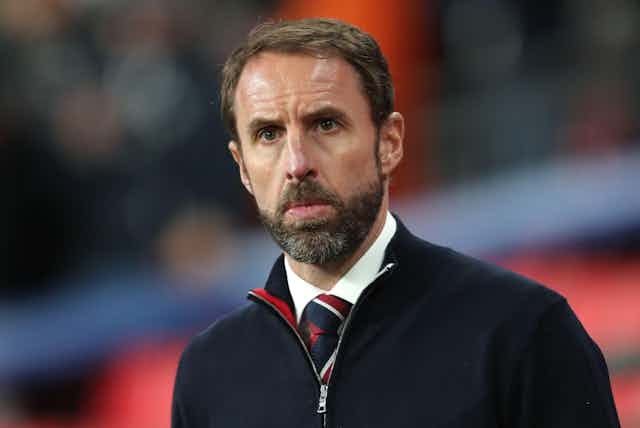Will they ever bring it home? Despite a general belief that England’s men’s football team performed well in the aftermath of their World Cup quarter final exit, inevitably questions are being asked about the team’s future hopes of success going forwards.
Some have suggested that the blame for England’s loss lies at manager Gareth Southgate’s door and believe he should be sacked.
Is it that simple? We can explore the question of whether Southgate has been a success issue by looking at his time as manager from a psychological perspective.
Transformational leadership
Up until now Southgate has received a lot of acclaim during his tenure as England manager. He has been commended for moves like transitioning older players like Wayne Rooney out of the team and introducing a wealth of young players like Bukayo Saka.
His handling of contentious issues has also been praised, such as his approach to encouraging COVID-19 vaccines in under 30s and his support of players taking the knee in response to racism.
Psychological theories and research show that a good leader changes their approach depending on what sort of leader a team needs and wants. For example, some teams like their leaders to ask the views of the group, which in this case would mean that the manager asks players their views on tactics and playing style. If this happens the players will be more satisfied with their leader.
The support for Southgate to stay as manager that has come from both the most established players such as Harry Kane, as well as squad members like Kieran Trippier suggests that he is a success in this regard.

Closely linked to leadership, is the idea of team cohesion or their bond. The degree to which Southgate can be considered a transformational leader – one who can inspire significant improvement in their team – is also dependent on how well he builds relationships and motivates England’s players to perform beyond their levels of expectations.
The praise Southgate has received inside and outside football in relation to his compassion would suggest he possess transformational leadership qualities. Such an approach to leadership means that it is likely that England’s players strongly identify with the team. This in turn leads to successful performance.
However, research also confirms that while supporting players is important, a good manager’s game plan and tactics remain key. A previous win or loss can also impact cohesion as well as future performance.
Overall, studies show that a successful manager needs a mixture of transformational leadership, cohesion and wins. So, England’s repeated inability to win tournaments could feasibly be related to Southgate not doing his job quite as well as he could. This means that while he can be considered a success in terms of the satisfaction of his players, he cannot in terms of performance alone.
Removing stress
A final consideration is that while the focus on Southgate’s record will centre around on-field success, it is important to consider some of the wider challenges he has had to face as England manager.

This includes the more political aspects he has to take on in recent years, including addressing racism and the human rights record of World Cup host nation Qatar.
This reflects the modern, wide-ranging remit of the England manager’s role. Although not obviously linked to performance on the pitch, by taking responsibility for discussing these issues away from the players, it could be argued that Southgate has played an important role in removing stress from the group.
Research shows that sportspeople can view external events of this kind as threatening and ultimately detrimental to them achieving their goals. So Southgate’s ability to address these issues and defend his players may be particularly important in them achieving success. We saw this in 2021 following the abuse suffered by Jadon Sancho, Marcus Rashford and Saka after England’s Euro 2020 final defeat.
It is difficult to definitively say whether Southgate is a good manager. But he is a transformational leader who has supported his players and they obviously like him. However, he has not been able to see them through to a major win.
It seems like, for now at least, he will stay, despite some questioning this decision. Hopefully, in the next big tournament he will be able to solidify his leadership with a win.

